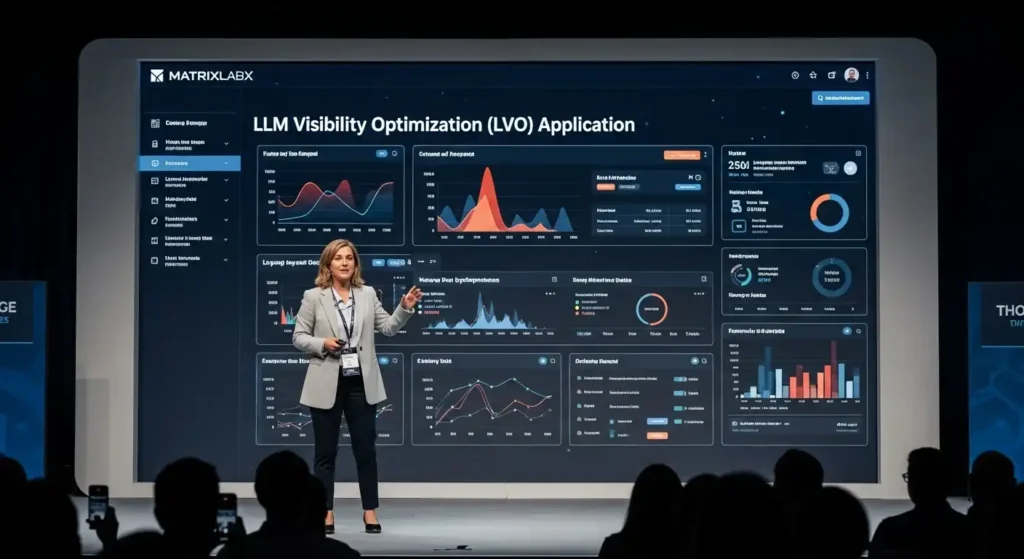Brand vs Competitors — Share of Voice
What-if: Content Push (this week)
Live Mentions
LLM Coverage Heatmap
The Whispering Walls of AI – Is Your Brand Being Heard?
Remember the intricate dance we all performed for SEO? The keyword research, the backlink building, the endless tweaking for that coveted top spot on Google? Those were the days of algorithmic kings and queens. However, the kingdom has evolved, power structures have shifted, and a new form of digital royalty has emerged, driven by the enigmatic whispers of Artificial Intelligence. Forget the tyranny of blue links; we’re now contending with the direct pronouncements of AI powerhouses.
Welcome, then, to the dawn of LLM Visibility Optimization (LVO), a concept also known, perhaps more intuitively, as Generative Engine Optimization (GEO) or Large Language Model Optimization (LLMO). It’s more than just another marketing buzzword; it’s a fundamental strategic realignment, a recalibration of how we ensure our brands aren’t just found amidst the digital noise, but are actively recommended, authoritatively cited, and favorably portrayed by the increasingly influential AI systems that are shaping the information landscape, namely entities like ChatGPT, Gemini, and Claude.
The question is not if LVO matters, but how much it matters. And the answer, for any brand with aspirations of remaining relevant, is: immensely. To ignore LVO is to deliberately consign your brand to a form of digital purgatory, invisible to a rapidly expanding segment of the audience that increasingly relies on AI as a primary source of information. This isn’t simply about diminished website traffic; it’s about forfeiting influence, abdicating your authority, and surrendering control of your brand narrative in this rapidly evolving digital landscape.
What Exactly Is LVO, and Why Is It the New SEO?
The core proposition of LVO is deceptively simple: it’s about strategically enhancing your brand’s presence and ensuring its positive and accurate representation within the actual, synthesized responses generated by large language models. Forget the relentless pursuit of ranking number one for a given keyword. Instead, envision your brand receiving a direct, unsolicited shout-out from an AI assistant, a testament to your authority and relevance, a direct endorsement woven into the fabric of the AI’s response.
The profound shift from the traditional SEO paradigm.

From Clicks to Citations:
Traditional SEO fixated on driving clicks to your website, viewing website traffic as the ultimate arbiter of success. LVO, in contrast, seeks a more direct and impactful form of validation: your brand, your products, or your services being explicitly mentioned, dynamically linked, or seamlessly embedded within the AI’s comprehensive answer itself.
This is not about driving traffic; it’s about securing a place within the AI’s knowledge graph.
Semantic Smarts:
The old SEO was a game of keyword stuffing, a blunt-force approach that often rewarded quantity over quality. LVO demands a more sophisticated sensibility, prioritizing the creation of content that AI can truly understand contextually and semantically. This means crafting clear definitions, elucidating entity relationships, and structuring your data in a way that aligns with the AI’s internal logic. It’s about speaking the AI’s language, ensuring that your message isn’t just heard, but deeply comprehended.
Authority is Everything:
In the Darwinian struggle for visibility within the AI ecosystem, authority reigns supreme. AI systems are inherently predisposed to prioritize trustworthy, expert sources. Your content, therefore, must exude E-E-A-T: Experience, Expertise, Authoritativeness, and Trustworthiness. These are not merely abstract qualities; they are the fundamental building blocks of credibility in the AI age.